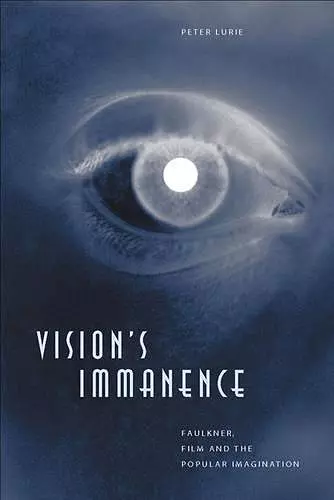Vision's Immanence
Faulkner, Film, and the Popular Imagination
Format:Hardback
Publisher:Johns Hopkins University Press
Published:7th Sep '04
Currently unavailable, and unfortunately no date known when it will be back

Among the surprising contributions of Vision's Immanence is a subtle interpretive discourse that moves seamlessly and persuasively between film and literature. Terms from film theory take on new and clarified meaning in relation to Faulkner's narratives, which can now be understood as cinematic, and Absalom! Absalom!, among other Faulkner narratives, emerges in newly revealed relation to early films, including Birth of a Nation. With its dual sensitivity to the conceptual implications of fictional form and to the character of film, this compelling reading of Faulkner will change critical understanding not only of Faulkner but of film's relation to modern literature. -- John Paul Riquelme, Boston University A brilliantly argued, elegantly written study of Faulkner's engagement with film. It finds Hollywood's deepest influence on Faulkner not in the obvious places (his screenplays or adaptations of his work) but in the formal properties of the novels and the critical consciousness of their author. Peter Lurie brings to light Faulkner's vexed awareness that the modern mind has been formed, informed, and deformed by the cinema. -- Leland Monk, Boston University Vision's Immanence constitutes one of the freshest, most imaginative reconsiderations of Faulkner's writing I know of, and achieves a new level of specificity and interpretive force among current efforts to rethink the relation between modernism and popular culture. The book brilliantly establishes one modernist's deeply felt implication in an expanding mass cultural marketplace, particularly in the dominant regime of visual culture. Lurie's highly original reading of Faulkner ought to lead criticism of that writer into its next important phase, but Vision's Immanence also possesses wider-ranging implications for understanding the dependence of modernist writing upon thematic and formal incorporation of cinematic, photographic, and pulp fictional habits of production and consumption. -- John T. Matthews, Boston University
Offering innovative readings of these canonical works, this study sheds new light on Faulkner's uniquely American modernism.William Faulkner occupied a unique position as a modern writer. Although famous for his modernist novels and their notorious difficulty, he also wrote extensively for the "culture industry," and the works he produced for it-including short stories, adaptations, and screenplays-bore many of the hallmarks of consumer art. His experiences as a Hollywood screenwriter influenced him in a number of ways, many of them negative, while the films turned out by the "dream factories" in which he labored sporadically inspired both his interest and his contempt. Faulkner also disparaged the popular magazines-though he frequently sold short stories to them. To what extent was Faulkner's deeply ambivalent relationship to-and involvement with-American popular culture reflected in his modernist or "art" fiction? Peter Lurie finds convincing evidence that Faulkner was keenly aware of commercial culture and adapted its formulae, strategies, and in particular, its visual techniques into the language of his novels of the 1930s. Lurie contends that Faulkner's modernism can be best understood in light of his reaction to the popular culture of his day. Using Theodor Adorno's theory about modern cultural production as a framework, Lurie's close readings of Sanctuary, Light in August, Absalom! Absalom!, and If I Forget Thee, Jerusalem uncover the cultural history that surrounded and influenced the development of Faulkner's art. Lurie is particularly interested in the influence of cinema on Faulkner's fiction and especially the visual strategies he both deployed and critiqued. These include the suggestion of cinematic viewing on the part of readers and of characters in each of the novels; the collective and individual acts of voyeurism in Sanctuary and Light in August; the exposing in Absalom! Absalom! and Light in Augustof stereotypical and cinematic patterns of thought about history and race; and the evocation of popular forms like melodrama and the movie screen in If I Forget Thee, Jerusalem. Offering innovative readings of these canonical works, this study sheds new light on Faulkner's uniquely American modernism.
Lurie fills a gap in Faulkner studies by looking at the influence of film and popular culture on the great Mississippian's work. Choice 2005 Well structured and elegantly written, this is one of the most important recent books on Faulkner. -- Paula Elyseu American Literature 2006
ISBN: 9780801879296
Dimensions: 229mm x 152mm x 20mm
Weight: 476g
256 pages